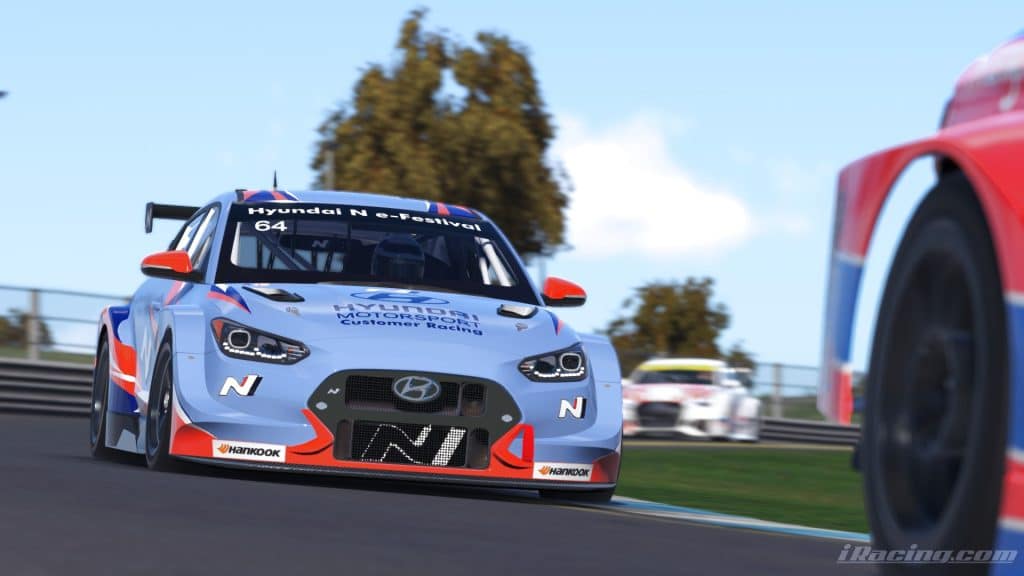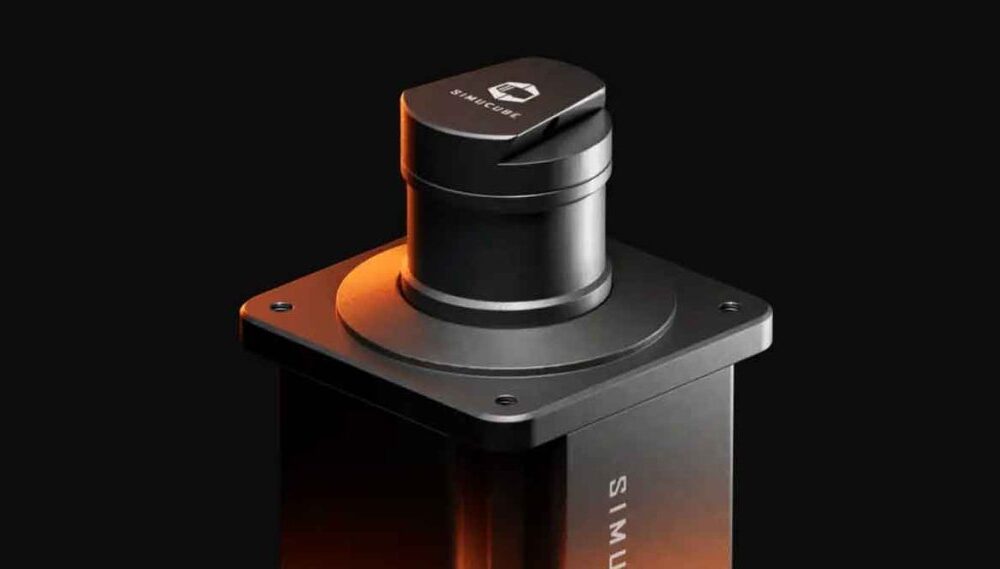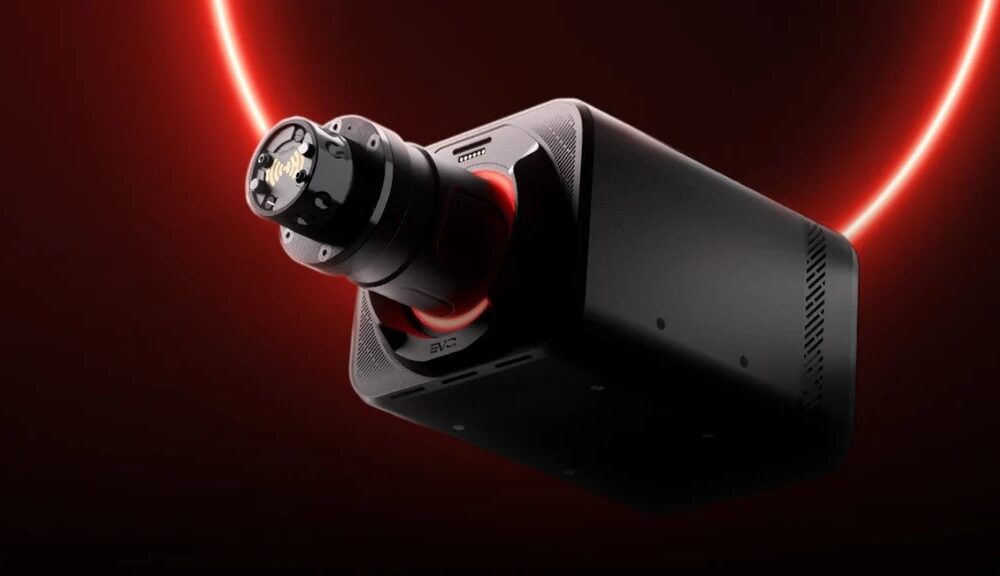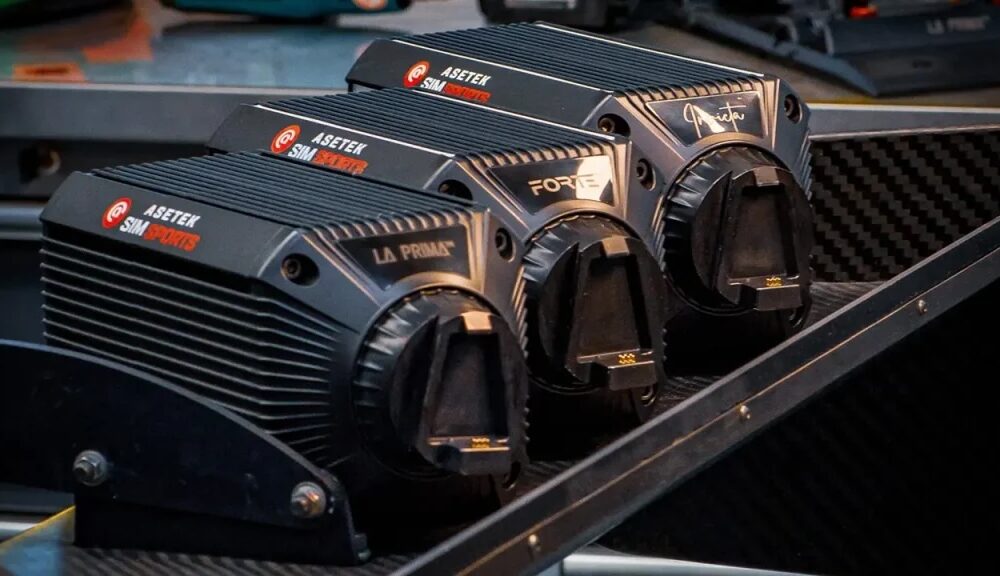Touring car competition is a thrilling and accessible form of road racing that captivates fans and drivers alike worldwide. These affordable, small-sized, and manoeuvrable cars are the stars of many national, regional, and international championships and events, such as the TCR World Tour, the British Touring Car Championship, the IMSA Michelin Pilot Challenge Series, and the Nürburgring 24 Hours.
While GT3s have a significant presence in simulators, touring cars are catching up. Currently, iRacing offers the TCR Virtual Challenge and the IMSA Michelin Pilot Challenge Series, RaceRoom features the WTCC and WTCR championships, and as of late 2023, Rennsport includes the Audi RS3 LMS and Hyundai Elantra N in its growing selection of vehicles.
Today though, we’re going to be diving under the hood of iRacing’s Hyundai Veloster.
Introducing The Hyundai Veloster TCR
The Hyundai Veloster TCR is the latest addition to the current touring car lineup in iRacing, which includes four cars: the Veloster was released in 2022 Season 2, the Hyundai Elantra N in 2022 Season 1, the Honda Civic Type R in 2022 Season 1, and the Audi RS 3 LMS in 2019 Season 4, making it the oldest (and unfortunately slowest) TCR car in iRacing.
- To learn more about how these challengers stack up against each other, check out our guide to the fastest TCR in iRacing.
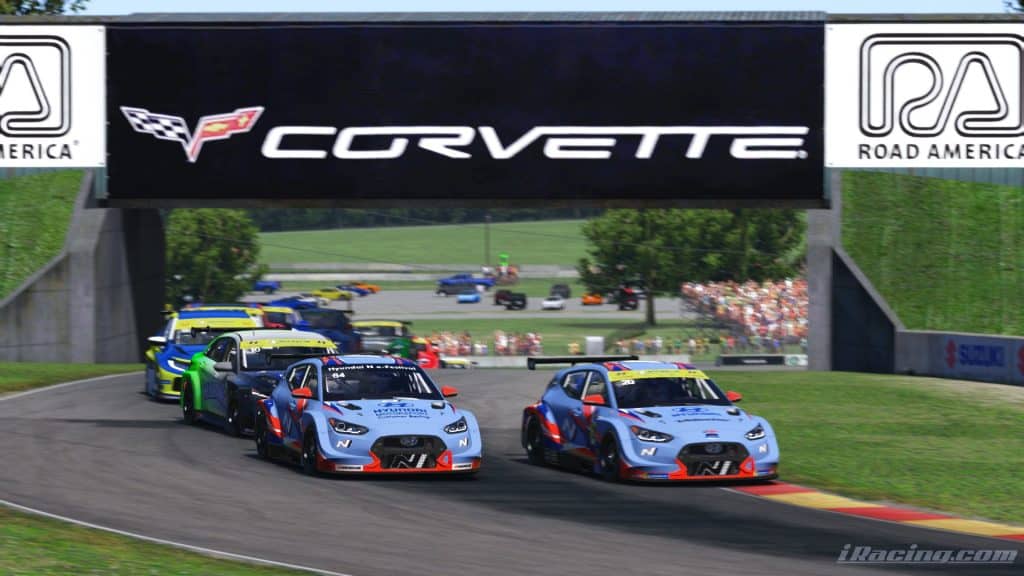
In the real world of racing, the Veloster TCR is not the newest car in Hyundai’s N performance lineup. The Elantra N, introduced in September 2020, is the primary Hyundai touring car model in many regional championships, including the IMSA Michelin Pilot Challenge Series. Nevertheless, a handful of racing teams still use the Veloster TCR – especially in the USA, where the Veloster’s competition is focused.
The Basic Car Characteristics
The Hyundai Veloster TCR is powered by a turbocharged 2.0-litre engine with a maximum power output of 350 horsepower and 450 Nm torque. A minimum weight of 1285 kg means that this car is relatively slow compared to other road racing cars and ranks just below the GT4 class regarding lap times.
As with the Honda Civic and Hyundai Elantra, the Veloster TCR is front-wheel drive – a key feature of the car that you will need to get used to if you are coming from driving GT3 cars, prototypes or single-seaters.
Steering and Cornering
The Veloster TCR has typical cornering behaviour for front-wheel drive cars. Since the static weight distribution of the vehicle is almost 3:2 front-to-rear, the rear end moves around a lot during the turn-in and the middle phase of a corner. The key to fast lap times is maximising cornering speed right on the limit of the rear grip.
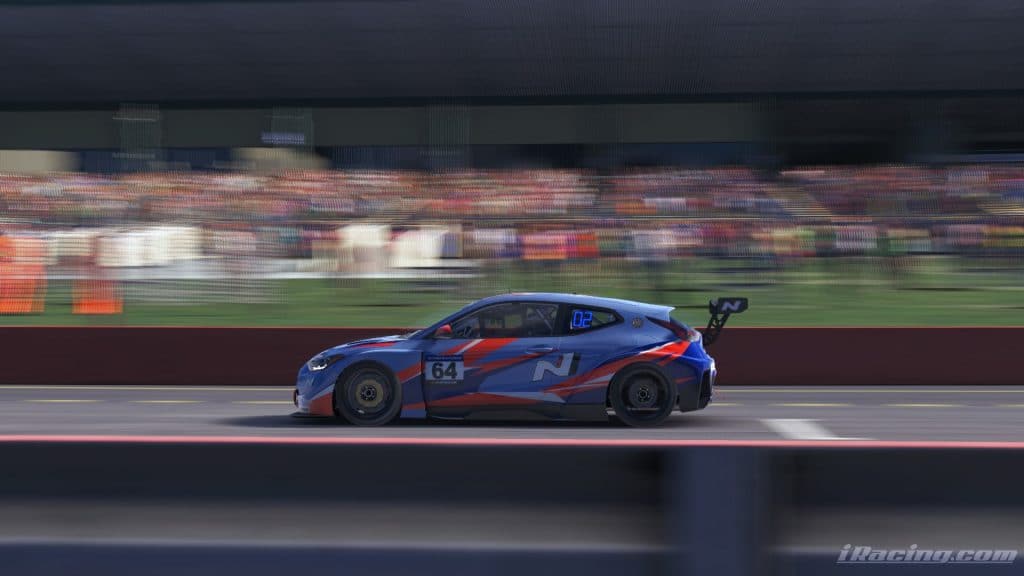
Warming up the rear tyres, especially before the fast lap in qualifying, can be difficult. The rear camber is usually set to high negative values (about -4.0 degrees) to increase cornering forces from the tyre, build heat and improve grip.
On the other hand, though, the front wheels tend to spin when you get on the power and will subsequently overheat and lose grip, generating understeer. The heavy front end also contributes to understeer, similar to how front-engine GT3s behave compared to the mid-engine cars. To mitigate these issues, you often need a soft front spring rate (70 N/mm), negative front toe values (up to -4.0 degrees) and low front ride height. Stiff bump and rebound dampers help to stabilise the car.
Need TCR iRacing Setups?
We are proud to have TCR setups back in Delta thanks to our new partnership with Lumen Motorsport, that are supporting the TCR Virtual Challenge Series. You can get setups every week of the iRacing season for the Veloster TCR, Elantra N TCR and Honda Civic TCR to ensure you’re at the top of your game.
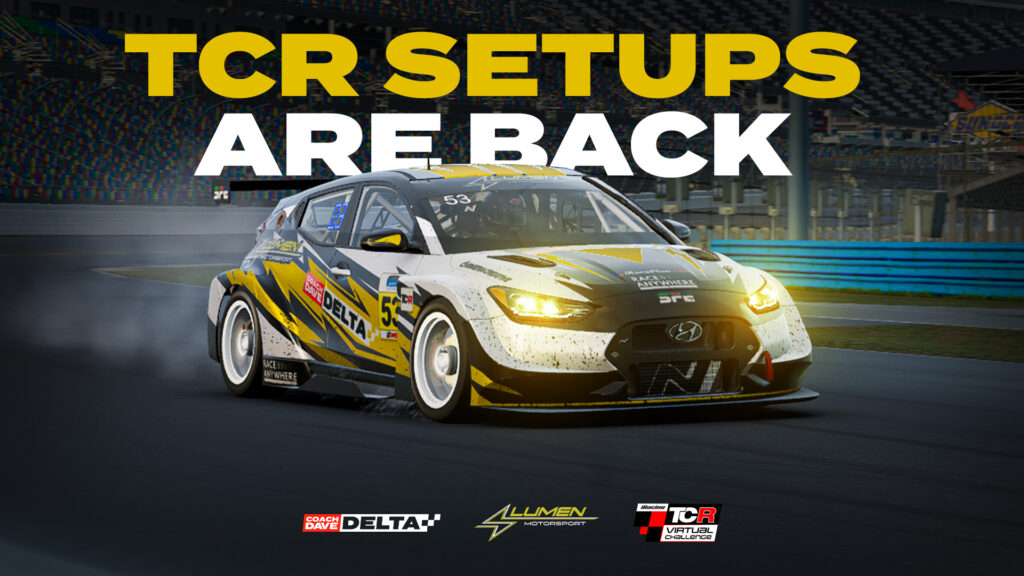
Gain seconds in lap time with our incredible iRacing setups that include professionally developed setups and referance laps for every car available in the official weekly racing series that you can find on iRacing.
Power Delivery
The positive feature of high static load on the front axle is a lot of grip for the powered wheels when under acceleration. You can be more aggressive with the throttle during acceleration in the Veloster than in rear-wheel drive cars such as the Audi RS3, for example.
Meanwhile, it utilises a small 2-litre turbocharged 4-cylinder engine that is mandatory for all vehicles in the TCR class, but in a straight line, you will notice that the Veloster is on the faster side. Compared to the Honda Civic FK8 TCR, which is better suited to slow-speed circuits, it bears a noticeable advantage and is similar in straight-line performance to its Hyundai TCR sibling, the Elantra.
Braking
The Veloster TCR has a basic anti-lock brake system (ABS) with five settings. Unlike GT3 cars, the ABS in the Veloster indicates the track condition where the system would work the best. For example, setting 1 is used for dry conditions, setting 2 is for damp conditions, and setting 3 is for wet conditions, which on paper gives you as a driver less to play with when trying to find those extra tenths.
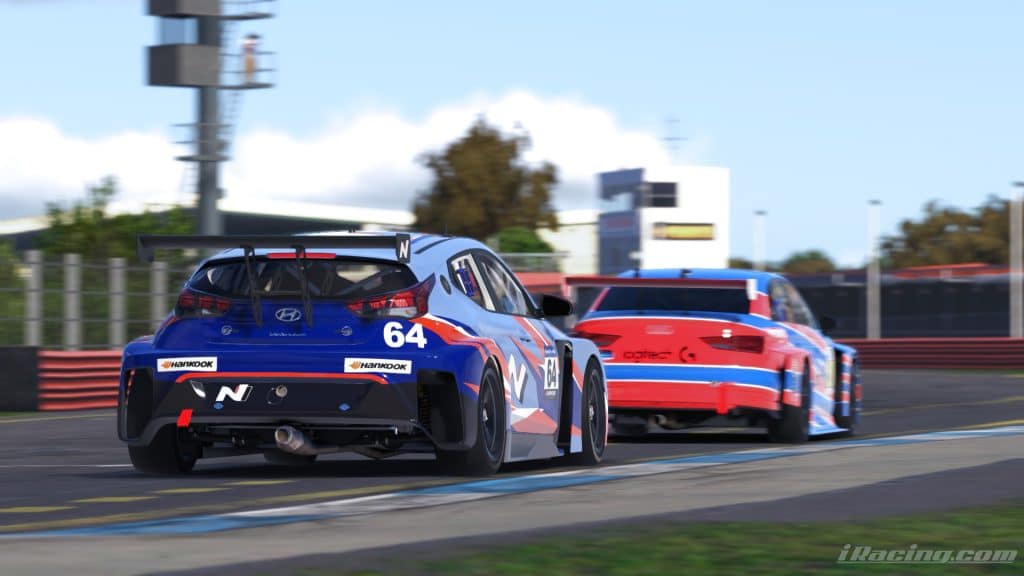
However, in reality, these settings can all be utilised in dry conditions and become an advantage of the Veloster due to the extra customisability that’s offered. The car also features a greater brake bias range than its TCR competitors, allowing you to further refine its braking potency.
Aerodynamics
The Veloster’s only adjustable aerodynamic element is the rear wing, which you can set between -4.0 degrees to +4.0 degrees relative to the default value. The car generates minimal aero downforce, so generally, you should keep the wing angle as low as possible to reduce drag. You can add a few clicks if you have reached the maximum mechanical grip but still want more stability at the rear in medium and high-speed corners. Overall, you’re going to want to shift your focus away from the Veloster’s aerodynamics.
Where You Can Race It
You can compete with the Veloster TCR in two regular iRacing championships: the Touring Car Challenge and the IMSA Michelin Pilot Challenge.
The Touring Car Challenge is available with a fixed setup for drivers with the D licence and an open setup for drivers with the C licence. Both versions of this championship feature all four touring cars available in iRacing. Races occur every two hours and last for 15 or 30 minutes (fixed and open setup, respectively), with up to 20 drivers on the grid. The base iRacing subscription usually offers three circuits in the calendar, while the remaining nine DLCs cost 15.95 USD each.
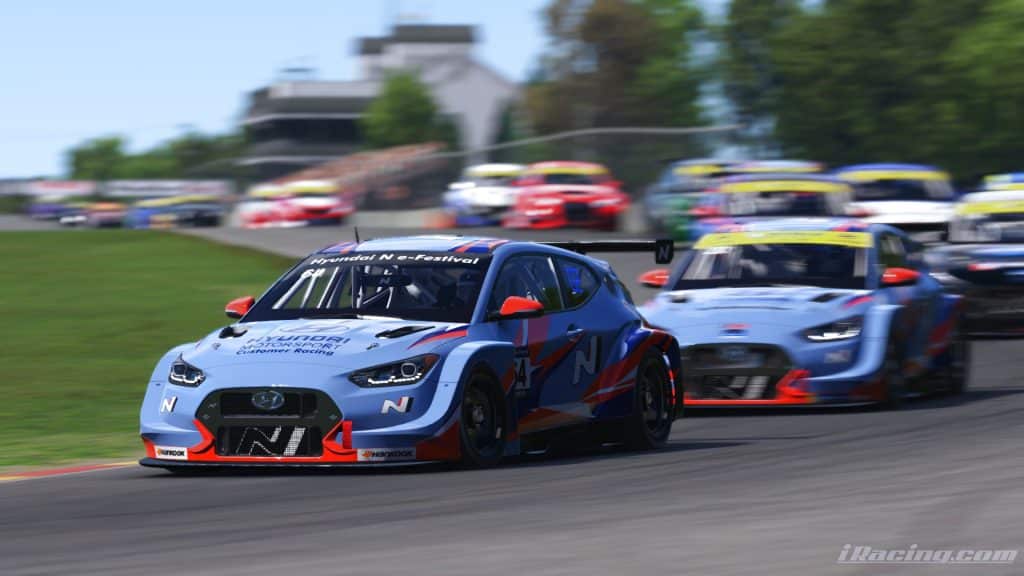
With a C licence, you can race in the IMSA Michelin Pilot Challenge, the most populated championship for touring cars in iRacing. This series also features GT4 cars and 2-hour races with no driver swaps. Sessions take place only on the weekends, and up to 40 drivers can participate in one split.
Final Thoughts
The Hyundai Veloster TCR is currently not the most popular touring car in iRacing, but with a correct setup, it is very competitive on most circuits. Coaches at Coach Dave Academy are always available to help you fine-tune the setup for your driving style to extract the most out of the car and get you to the front of the grid.
AI Coaching that actually works
Don't get lost in the data, instantly unlock lap time using our new real-time Auto Insights coaching. Elevate your braking, apex, and exit performance in record time.

